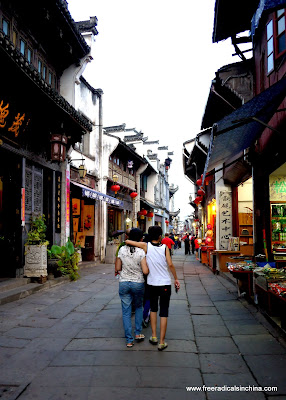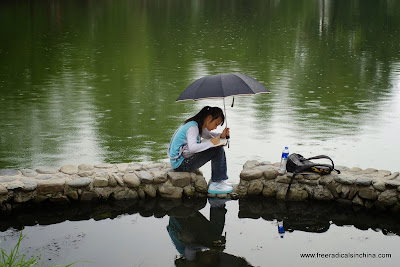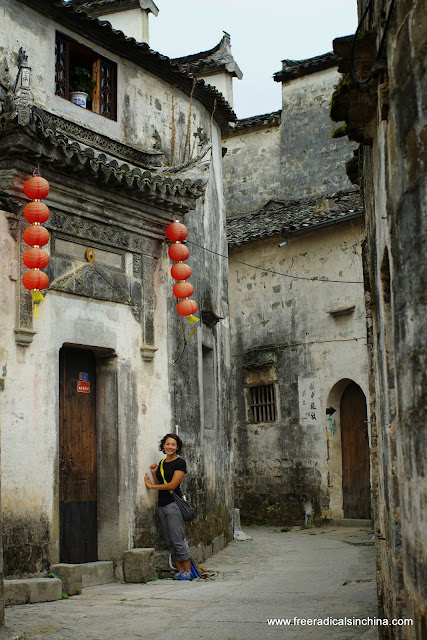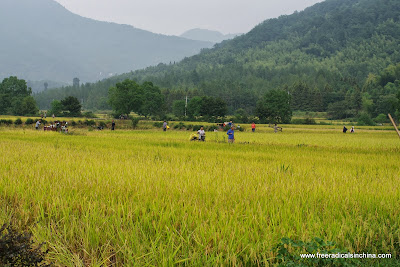If you go down in the streets today, Baby, you better,
You better open your eyes.
Folk down there really don't care, really don't care, don't care, really don't
Which, which way the pressure lies,
So I've decided what I'm gonna do now.
So I'm packing my bags for the Misty Mountains
-Led Zeppelin
Early
September, we escaped the concrete jungle with an easy two hour flight south to
Anhui Province. Our goal was to see one of China’s national treasures: Huang
Shan (Yellow Mountain 黄山). The dramatic
scenery has inspired legends, poetry, and the backdrop for James Cameron’s Avatar.
Huang Shan
did not disappoint. The pines precariously lodged within the chiseled cliffs
and the clouds mysteriously slinking through the crevasses like a silent
mountain song overwhelmed us, inspired us, and revived us. Our awe was only
interrupted with the sounds of rambunctious tourists chatting,
talking, yelling, and spitting. Yes, like any spot in China, the place was
covered with people.
The
following is a detailed description of our 4-day excursion south to a warmer
clime. Information on travel to Huang Shan is scant, so I hope the following
may help backpackers planning to experience one of China’s natural wonders.
Skip to the pictures if you don’t like to read (you know who you are).
This blog
entry includes the following main points:
- Day 1 – Beijing (北京) to
Tunxi (屯溪)
- Day 2 – Tunxi (屯溪) to
Huang Shan (黄山)
- Day 3 – Huang Shan (黄山) to
Tunxi (屯溪)
- Day 4 – Hongcun (宏村)
Ancient Village to Beijing (北京)
- Cost
Day 1 –
Beijing (北京) to Tunxi (屯溪)
After
landing in Tunxi late Sunday night, Steven from
Huang Shan Bed and Breakfast picked us up from the airport. That evening we chatted with Steven and sipped
tea. The accommodations were extremely clean, comfortable, and came with a
fried rice breakfast. Our one night stay in a private room and bath was a deal
for 150 RMB ($25 USD).
Day 2 –
Tunxi (屯溪) to Huang Shan (黄山)
Steven drove
us to the train station and arranged for us to take a bus to Huang Shan’s front
gate. The 2 hour ride cost 17 RMB ($3 USD) per person. After arriving at the
main gate and paying another 19 RMB ($3 USD) per person, we boarded another bus
bound for Yungu (云谷) Temple Station located on the east side of the park.
There we paid the steep Huang Shan entrance fee of 230 RMB ($38 USD) per
person.
From Yungu
Temple Station, tourists can ride a gondola for 80 RMB ($13 USD) per person, or
climb 6 km of stairs. As self-proclaimed hikers and frugal travelers, we opted
for the stairs. After about an hour of stairs (and only stairs), I felt like my
13-pound backpack was 50-pounds. I was literally from-head-to-toe drenched with
sweat and wishing we had forked over the 80 RMB to ride the gondola.
 |
| I am so sweaty |
We climbed
the stairs alongside a parade of porters-- the unsung heroes of mountain
tourism. They were work oxen, their lean bodies balancing heavy loads across
their shoulders as they carefully took each ascending step. They rested their
loads on a bamboo stake as they sipped water, wiped their brows, or smoked a
cigarette. Their calves bulged- the result of thousands of uphill treks with
100 to 200 pounds of supplies. The porters were both young and old. Despite
laboring under the load, they willingly offered a smile or asked what country
from whence we came. Ok, maybe my 13-pound backpack was not so bad after all.
As a side
note: I have added Huang Shan porter to my list of jobs in China I would hate
(another example is bathroom lady: she sits in a stinky public bathroom but I
don’t know if she actually does anything because the floors are dirty and the
wastebasket is spilling over with used toilet paper).
These
porters probably carried up the drywall, paint, concrete, and other supplies to
construct the large hotels perched at the top of the mountain. The hotels are
not quaint structures that blend in with the mountain scape. The purple carpets
and purple velvet sofas, the gold chandeliers, and fake marble paneling
reminded me of Reno’s casinos which saw their heyday 20 years ago. Despite clashing
with the environment, the hotels are a construction marvel.
We lodged
one night at the Paiyunlou Hotel. We chose the cheapest option at 150 RMB ($25
USD) for single-sex dorms. The rooms were small and crammed with three bunk
beds. Each dorm room has a bathroom. I
roomed with 5 other Chinese tourists. Bedding is provided, but no toilet paper
or towels. The rooms are definitely not luxurious, but they start out
reasonably clean. After one night of sweaty tourists, a perpetually unflushed
toilet, and used toilet paper accumulated in the waste bin, the place reeked.
My roommates were nice—and I hate to nit-pick— but they just didn’t flush the
toilet and they smelled like body odor. Fortunately, perfect mountain weather
beckoned us outside and we spent little time in the dorm.
Our dorms
were conveniently located at the edge of the West Sea (西海). The
“sea” refers to the layer of clouds that hover above the canyon and below the
mountain peaks. Our legs on fire after the morning’s tough climb, we spent the
rest of the day hiking the well-maintained paths that descend into the canyon.
The scenery was amazing.
 |
| Feel the love! Lovers inscribe their names on locks, lock them up and throw away the keys to symbolize everlasting love |
Day 3 –
Huang Shan (黄山) to Tunxi (屯溪)
Early in the
morning, a parade of tourists fumbled through the dark and up the steep stairs
to claim a spot at the edge of the rim and watch the sunrise. We fumbled along
with them, and thinking ourselves smart, perched at an outlook that connected
to the main trail and a bit below Red Cloud Peak (丹霞峰). We
hoped that the procession of tourists would continue onto the peak and leave us alone. But that hope was in vain. This mountain was just simply covered
with tourists. We soon found ourselves elbow to elbow with chatting, snacking,
and spitting tourists. Come on people! The sun gently rising above the misty
clouds should be enjoyed in silence.
 |
| Watching the sunrise along with everyone else |
After a
pretty anti-climactic sunrise (the clouds blocked the rise and the tourists
blocked the silence), we beat the crowds and took a relatively solitary hike. Even
though our legs ached from the previous day’s climb, we persevered and climbed
up to Flying Over Rock (飞来石) and Brightness Top (光明顶) to take in more amazing
scenery.
 |
| Flying Over Rock |
Six
kilometers of stairs, two bus rides and 4 hours later, we returned to Tunxi.
Deprived of food, we ate at the first restaurant we could find in Tunxi Old Town.
Tunxi Old Town,
the city’s historical center, now caters to tourists. The narrow alleys house
charming calligraphy, knick-knack and garment shops as well as restaurants.
birdMAN is not much of a shopper. He tends to briskly walk through merchant
areas— especially if he is hungry. If you are not like my husband, Tunxi Old
Town offers plenty for the curious shopper inclined to spend money.
 |
| Anybody want to buy this very uncomfortable bathtub? Just kidding, I have no idea what this thing is for. |
We wandered
up, down, and around the alleys for about 2 hours before we finally found
the Hui Boutique Hotel. We had booked our room online for 350 RMB, a considerably
steeper price than our stay outside of Old Town. However, the location was
ideal—smack in the center of charming old town. The staff was friendly and the hotel
was clean, neat, and reminiscent of ancient China. We spent the evening
relaxing and watching
Seven Pounds starring Will Smith (I give the movie a C) on
the room’s flat screen television.
 |
| Courtyard at the Hui Boutique Hotel |
 |
| Tunxi Old Town |
Day 4 –
Hongcun (宏村) Ancient Village to Beijing (北京)
We had the
whole day to kill before our evening flight, so we took off to the countryside. Our
destination was Hongcun (宏村) Ancient Village. Scenes for Hidden Dragon Crouching
Tiger were filmed there. After paying the 104 RMB entrance fee per person, we
only had about 3 hours to eat and explore.
There we
wandered the narrow passageways from ancient home to ancient home, from garden
to garden, from craft shop to craft shop. At a family run restaurant, we
bargained with a friendly young man for a 3 dish meal for 100 RMB. As we
savored streaky pork, spicy tofu, and braised vegetables, we watched the clouds
threaten rain, the tourists taking pictures in the alley below, and the
family’s freshly-washed laundry dry in the gentle breeze.
The internet
provides good direction on how to get to and from Hongcun. We could have opted to pay a private driver or taxi for a quicker
(and more expensive) ride, but sitting among the locals and taking in a piece
of their lives is far more interesting. Along the 2 hour route, we watched both
old and young rural people get on and off at the small villages dotted along
the highway. They carried pieces of their lives with them: plastic bags full of
green veggies for that night’s dinner or pickling for a later meal, school bags
with books and cellphones, a set of pots and pans and a large grey sack full of
sundries. After feeding her children packaged stinky tofu, a mother
nonchalantly chucking the plastic wrapping out the bus window. Two men speaking
in the Anhui dialect as their cigarette poofs wafted through the bus and
amongst fellow passengers. School children in white and blue jumpsuits heading
home after a long day at distant schools.
That night we flew back to Beijing. And Beijing welcomed us with
familiar sounds of the Beijing dialect and pollution.
 |
| Art students hone their skills in Hongcun |
 |
| Where is a ninja when you need one? |
 |
| Rice harvest |
Cost
This trip
was not cheap (especially if you are surviving on Chinese wages). For
comparison, a typical plate of dumplings would cost 10-15 RMB ($1.60 -$2.40
USD). On the mountain, we forked over 40 RMB ($6.50 USD) for twelve dumplings,
which scarcely sated our hunger. A liter of water cost 25 RMB ($4.00 USD),
verses 3 RMB ($0.50 USD) off the mountain. Each person pays an entrance fee of
230 RMB ($37 USD); in contrast, a carload of people can enter California’s
Yosemite National Park for $20 USD.
Including
plane tickets from Beijing to Tunxi and back, we spent about $870 USD for 4
days. See Vacation Cost Table for a cost breakdown.

In sum, we
spent a lot of money. We rubbed elbows with annoying tourists. We sweated a
lot. The mountain climb left us with achy legs and insatiable appetites.
Was it worth
it? Absolutely. Huang Shan is spectacular. I want to go back next year—and ride
the gondola up.
Chinese word
of the blog: 壮观 zhuàng guān
English
translation: magnificent
Example
sentence:黄山的景色真壮观Huángshān de jǐngsè zhēn zhuàngguān
English
translation: Yellow Mountain scenery is spectacular.
Chinese tourists are in the news!
Read More:









